HSBC’S
DIRTIEST DEALS:
HOW HSBC FUNDS SUFFERING WORLDWIDE
Report first published: May 2021
Executive summary & introduction
UK-headquartered HSBC is one of the biggest financiers of fossil fuels in the world. The influential Banking on Climate Chaos report demonstrates that since the Paris Agreement was signed and until the end of 2021, HSBC has funded an eye-watering US $130 billion in fossil fuels around the world.
But dollar figures only tell us so much. This report is about the human and climate impacts behind the numbers.
From controversial oil pipelines in Canada to gas projects in war-torn regions of Mozambique, from propping up Indonesia’s coal industry to supporting the world’s single most polluting company, HSBC is involved in some of the dirtiest and most destructive deals on Earth.

Image: a coal cleaning and processing plant in Samarinda, Indonesia. Image credit: Cassidy K. / International Labour Organisation)
Together, the small selection of HSBC projects we highlight here, once they are all operational, will emit 523 million tonnes of CO2 every year – more than the entire annual emissions of either Canada or Brazil, or nearly one and a half times the annual CO2 emissions of the UK.1
We demonstrate how HSBC’s funding of fossil fuels, across many different geographies, makes a mockery of the bank’s claim to support the Paris Agreement.
Drawing on research from a variety of sources, we also show how many of these dirty projects can only turn a profit in a world where we fail to meet global climate goals.
HSBC’s shareholders and customers should be concerned that HSBC is banking on the Paris Agreement’s failure, locking the world into climate chaos.
HSBC claims to be a leader in sustainable finance. But our findings show it is a leader in human suffering. The companies HSBC are happy to fund ruin lives. In Mozambique, a HSBC-funded gas project exacerbates an insurgency that has seen unimaginable brutality and left thousands dead. In Kazakhstan, the bank supports the Tengiz oil project, which has been linked to the alleged poisoning of communities from a deadly gas that is the by-product of oil extraction. In North America, HSBC’s funding for pipeline companies helps enable brutal repression of protesters and runs the risk of poisoning lands held sacred by indigenous peoples.
There can be no climate change leadership, no sustainable finance leadership, for institutions that invest in fossil fuels during a climate emergency.
HSBC’s approach to its climate change and energy policies needs more than just tweaks. It needs a complete overhaul, with clear phase-out dates for coal, oil and gas, at the pace that science demands.
HSBC should not be invested in any company or project that only succeeds if the Paris Agreement fails, and must prioritise investment in companies and projects that accelerate the economic transformation towards the Paris Agreement’s goals.
Dirty deals down under
Over the last 10 years, Australia has ramped up its exports of LNG enormously, becoming the world’s largest exporter in the calendar year 2019.
LNG has no place in a decarbonising world. In fact, the LNG industry needs to decline along with all other fossil fuels to meet the Paris climate goals. According to modelling from the Intergovernmental Panel on Climate Change (IPCC), a 1.5° C scenario (P1: no or limited overshoot) would see primary energy from gas decrease by 25% by 2030 and by 74% by 2050 (from a 2010 baseline). There is no room for the new gas industry that LNG advocates are building.
As well as wrecking the climate, research funded by the gas industry itself demonstrates that LNG development displaces renewable energy.2 This makes HSBC’s support for both the Paris Agreement and some of Australia’s biggest LNG projects contradictory.
HSBC committed US$170 million for the 2019 refinancing of the Australia Pacific LNG (APLNG) project, which styles itself as ‘Australia’s largest supplier of coal seam gas‘. APLNG’s liquefaction and export facilities sit within the Great Barrier Reef World Heritage Area. The shipping, coastal industrialisation and climate change caused by these plants are a significant threat to the Great Barrier Reef. APLNG is now seeking to expand its operations by drilling 7,700 extra gas wells, creating even more significant dangers to the climate. It remains to be seen whether HSBC will fund this expansion too.
Ironically, despite financing this danger to the Great Barrier Reef, HSBC claims it is a protector of the Reef, publicising a financial instrument it calls ‘reef credits.’ However, given that the IPCC states that 70-90% of coral reefs will die if the Paris Agreement 1.5° C goal is breached, and 99% will die at 2° C of warming, HSBC’s support for APLNG cancels out any possible good that its ‘reef credits’ could ever do.
HSBC also participated in two refinancing deals for the Ichthys LNG project, “one of the world’s most significant oil and gas projects.” Market Forces analysis estimates that over the lifetime of the Ichthys project, it would enable the release of 1.13 billion tonnes of CO2, double Australia’s annual greenhouse gas emissions.
Ichthys isn’t just bad for the climate, it’s potentially a disaster for those working and living around it. A January 2019 audit found electrical hazards that could result in a gas explosion.
HSBC’s support for LNG mega-projects in Australia can’t be reconciled with its rhetoric on climate action.
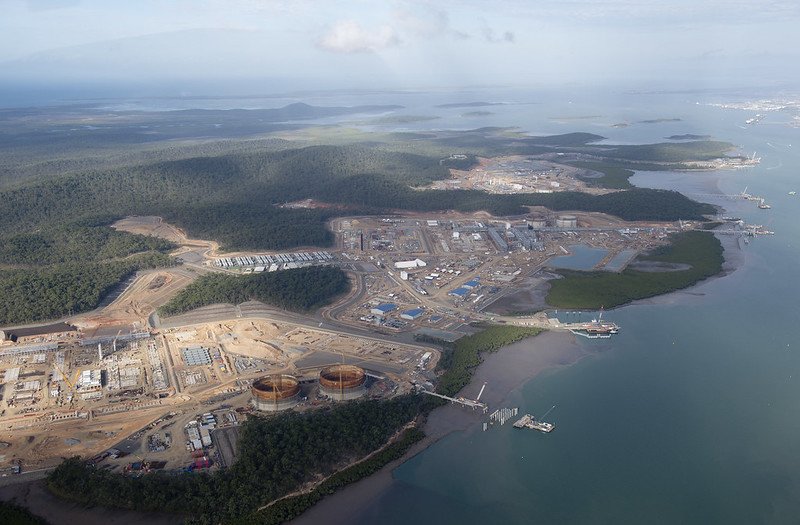
Image: Curtis Island LNG Plants, Queensland, Australia. Image Credit: GreensMPs
Coal in Indonesia
HSBC has recently tried to talk a better game on coal – the dirtiest fossil fuel – but it remains deeply involved in propping up the coal industry.
In June 2017, HSBC refinanced the Paiton-3 coal plant in Java, Indonesia. A month before, the East Java Environment Agency declared Paiton-3 to be the biggest source of toxic waste in the whole of East Java, producing 80% of the 170 million tonnes of toxic waste produced in the province. Despite this clear environmental hazard, the project obviously passed HSBC’s environmental due diligence.
The bank is also a major financier of Adaro, one of Indonesia’s biggest coal companies, having loaned approximately US$322 million to Adaro since 2006.
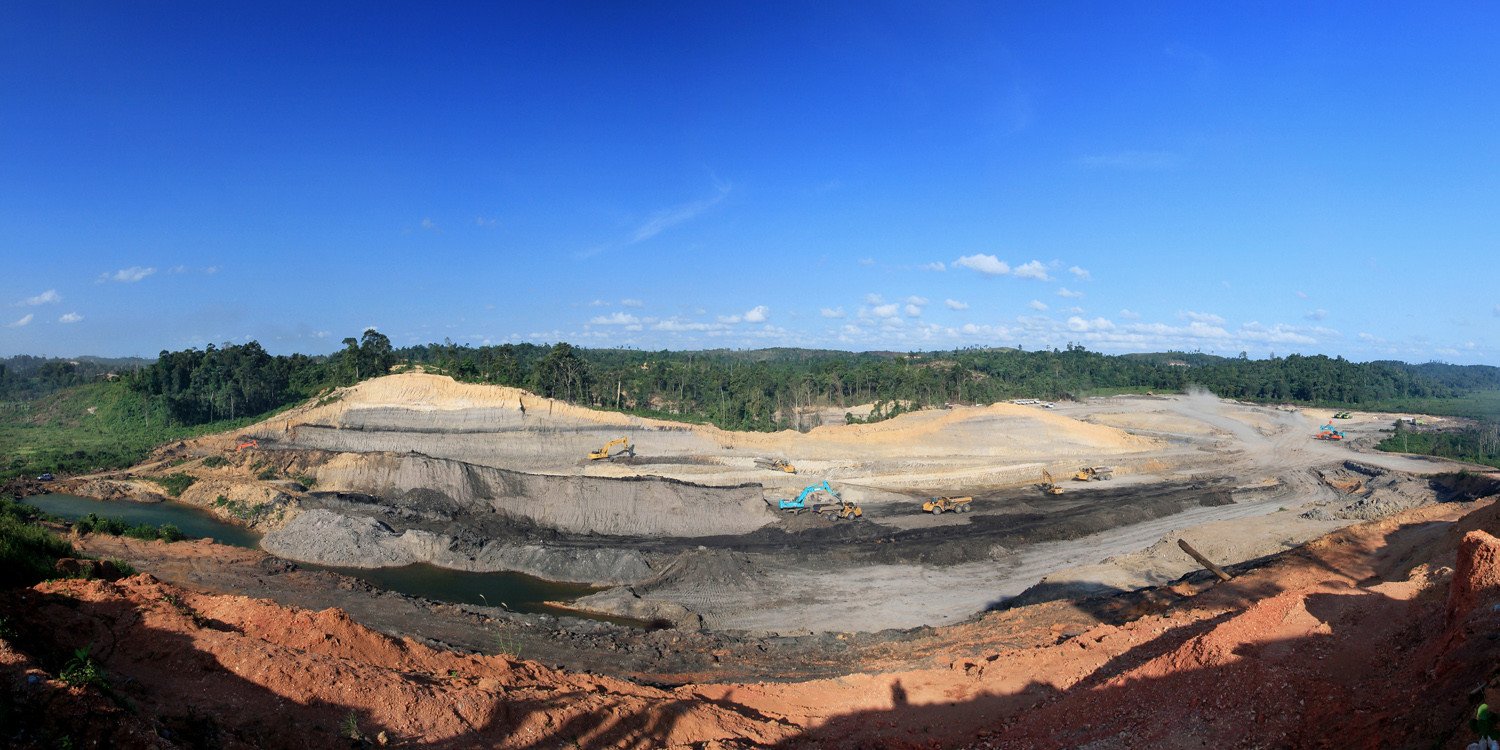
Image: a coal mining site in Indonesia, surrounded by forest. Creative commons. Image credit: Parolan Harahap.
Despite the inevitable decline in global coal markets, Adaro has no plans to transition away from coal. The first objective in Adaro’s business strategy from its latest-published annual report is to “maintain (thermal coal) profitability as the group’s cash cow.” Although HSBC claims to believe in a transition in line with the Paris Agreement, it is happy to fund Adaro, which has no credible transition plan and whose business model – solely focused on coal – is consistent with the failure of the Paris Agreement.
HSBC’s plans to continue coal finance until 2040 in non-OECD countries like Indonesia means nearly two more decades of financing for some of the world’s dirtiest companies like Adaro, with disastrous consequences for the climate.
HSBC’s new coal policy will not affect its ability to hold shares in coal companies. Market Forces data shows HSBC has ownership stakes in coal companies that together plan 73 new coal plants generating 99 gigawatts (GW) of coal power, including in Indonesia, Vietnam and Bangladesh. If built, these plants will emit 15 billion tonnes of CO2 over their lifetimes, 32 times more carbon than the UK currently emits in a year. The United Nations has said that all planned new coal plants should be cancelled in order to meet global climate targets, yet HSBC literally owns the expansion of the coal power industry.
Pipelines in North America
Oil and gas pipelines are on the front lines of the climate battle in North America. Pipelines enable the transport of billions of tonnes of climate killing oil and gas, from the Canadian tar sands of Alberta to the shale oil fields of Texas. HSBC has been an enthusiastic backer of these pipelines.
The bank provided US$151 million to Kinder Morgan Inc to expand the controversial Trans Mountain Pipeline, which will increase capacity to 890,000 barrels a day. The pipeline, fiercely opposed by residents and indigenous groups, will emit 130 million tonnes of CO2 per year when completed. What’s more, research from the Canadian Parliamentary Budget Office stated that if climate policies become more stringent (a virtual certainty), then the subsequent drop in oil demand may mean the pipeline will not be profitable. A 5% drop in the pipeline’s utilisation from the reference case “would result in a negative valuation of the assets -[CA]$400 million.”3 This means the success of the pipeline is enhanced by climate policies failing to improve and become more stringent. HSBC is therefore banking on that failure.
HSBC also helped finance the 1000 km+ Wink To Webster oil pipeline. The pipeline, able to move more than 1 million barrels a day, will greatly increase the capacity to remove oil from the Permian Basin. The Permian Basin is one of the world’s deadliest threats to the climate, a gigantic oil and gas basin in the southern United States. According to analysis based on data from energy analysts Rystad, emissions from exploiting all developed and undeveloped reserves from the Permian would equal nearly 55 billion tonnes of CO2, or 10% of the entire world’s carbon budget for keeping global warming under 1.5ºC. HSBC’s financing for the exploitation of the Permian Basin is inexcusable and indefensible.
Although HSBC has said it will no longer provide project finance for pipelines, HSBC can still finance the companies building the pipelines, allowing the bank to enable as many pipelines as it or its clients wish in future, showing up the bank’s pipeline pledge as purely cosmetic.
HSBC is using this mechanism to help fund five corporate loans for Enbridge totalling US$8.5 billion. Enbridge is the company building the controversial Line 3 pipeline from Alberta, Canada to Wisconsin, USA. Line 3 would carry 760,000 barrels of tar sands oil per day, emitting 193 million tonnes of CO2 every year, expanding the scale of the fossil fuel industry in the middle of a climate crisis. As well as the obvious climate impacts, the Line 3 construction has brought troubling reports of ‘man camps’ bringing spates of drug trafficking, sex trafficking, and violent crime to construction areas, which have disproportionately affected Indigenous women in particular.
If HSBC is serious about climate change, its pipeline policy must become more than a PR exercise.
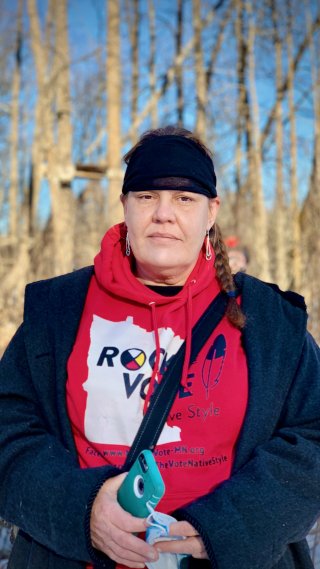
Image: Nancy Marie Beaulieu, a member of the Leech Lake Band of Ojibwe, at the Mississippi River, where HSBC-funded Enbridge are planning to build the Line 3 pipeline over the river. Image credit: Sarah LittleRedfeather, Honor the Earth
Gas in Africa
Emissions calculations for gas usually underestimate the powerful impact of methane, a highly potent greenhouse gas that has 80 times the warming potential of carbon dioxide over two decades. Industry data demonstrates that if gas continues to be produced at the current rate, even the complete phasing out of coal and oil wouldn’t be enough to avoid the worst impacts of climate change.
Therefore, HSBC’s role in opening up two new gas fields in Africa shows the hypocrisy of their claims to support the Paris Agreement.
Not only are these new gas fields disastrous for the climate, they are disastrous for the local people who have to live with the impacts of the projects.
The Coral South LNG (Liquified Natural Gas) Project is located off the coast of Mozambique’s Cabo Delgado region, an area in the midst of a violent insurgency carried out by an ISIS-affiliated group. The United Nations reported 420,000 people in Cabo Delgado were forced out of their homes in 2020, as insurgents fought government troops.
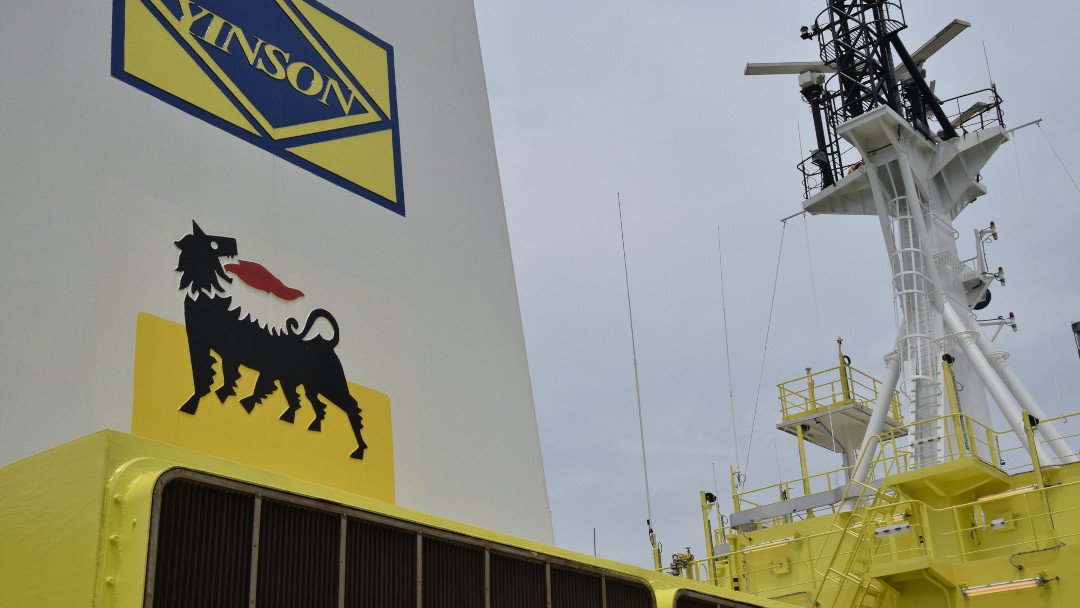
Image: a floating gas unit owned by Eni, for the Offshore Cape Three Points project (OCTP). Analysis shows the project will only deliver an economic return if the Paris Agreement fails.” Image credit: Eni
HSBC has provided US$300 million for Coral South which, when operational in 2022, will be able to process 3.4 million tonnes of liquified natural gas per year. The build-out of gas infrastructure in Cabo Delgado – of which Coral South is part – has provided the insurgency with tempting targets. For example, eight gas project workers were killed in an attack by militants in July 2020.
The UN has blamed not just the insurgency for the chaos in Cabo Delgado, but also the behaviour of ‘extractive firms,’ including companies exploiting gas.
By supporting the development of gas infrastructure in Mozambique, HSBC is fanning the flames of the conflict, as well as wrecking the climate.
The Offshore Cape Three Points Project (OCTP) in Ghana is another example of HSBC’s complicity in opening up brand new gas fields. HSBC’s US$135 million commitment has helped to make OCTP a reality, pumping out 85,000 barrels of oil equivalent every day. The fields that make up the project hold 1.5 trillion cubic feet of gas and 500 million barrels of oil in total.
As well as being a climate bomb, OCTP is mired in controversy because of the terms of the contract between the Ghanaian Government and the extractive companies. Under a ‘take or pay’ clause in the contract, Ghana must pay for the gas whether it uses it or not. The Ghanaian Government was left with a US$250 million bill for unused gas in 2019 due to this, which is contributing to the country’s debt crisis, destabilizing the country’s economy and hampering the transition to renewable energy.
Offshore Cape Three Points is not just an economic disaster for Ghana. According to the Carbon Tracker Initiative, OCTP will only deliver an economic return if the Paris Agreement goals are not met. HSBC is providing finance to a project whose success depends on the failure of the Paris Agreement, making a mockery of its professed support for the Agreement.
Saudi Aramco – HSBC’s relationship with the world’s biggest polluter
The Saudi Arabian Oil Company (Saudi Aramco), is the world’s single biggest polluter. Between 1965 and 2019, the state-controlled company emitted 4.38% of the entire world’s greenhouse gas emissions. The Saudi Arabian state that Aramco serves is widely seen as a ‘blocker’ in global climate talks, preventing progress towards achieving agreement between nations on climate goals.
In a world that meets the Paris climate goals, Saudi Aramco would need to rapidly bring its oil and gas production to an end. However, it plans to do the opposite, intending to produce oil and gas equivalent to 27 billion tonnes of carbon dioxide by 2030 – 4.7% of the entire world’s carbon budget to stay under 1.5ºC.
Aramco has found a willing partner to help it expand – HSBC.
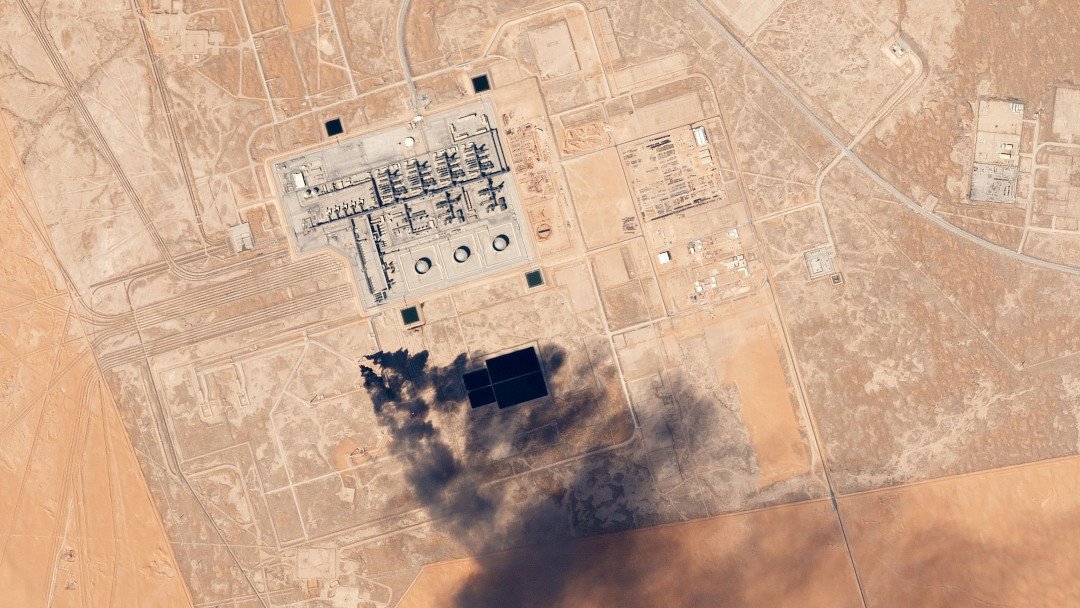
Image: pollution from the Saudi Aramco Khurais Oil Processing Facility, visible from space.
HSBC is a major banker for Saudi Aramco. Image credit: Planet Labs, Inc.
While other financial institutions distanced themselves from the Saudi Kingdom in the wake of the killing of Jamal Khashoggi in 2019, HSBC became the only global bank playing a lead role in arranging Saudi Aramco’s Initial Public Offering (IPO) on the Saudi Stock Exchange. It was the world’s largest IPO at that point, raising US$25.6 billion to finance Aramco.
HSBC also helped finance the Refinery And Petrochemical Integrated Development (RAPID) project in Malaysia, a joint venture involving Saudi Aramco. This oil refining complex is capable of producing more than 200,000 barrels per day of liquid fossil fuel products including petrol, diesel, jet fuel and fuel oil. Combusting this volume of fossil fuel would
result in the addition of 85,000 tonnes of CO2 to the atmosphere each day. Safety issues at the plant have been raised, with two separate explosions occurring within a year of each other, the second one in March 2020 killing five workers.
HSBC also provided US$97 million for the refinancing of Aramco’s 305,000 barrel-per-day refinery in Jubail in December 2019. The bank also acted as a financial advisor on an April 2021 US$12.4 billion transaction where a coalition of investors bought a large stake in a
newly-formed Saudi Aramco subsidiary, Aramco Pipelines. In May 2021, with its AGM approaching, it was announced HSBC is advising Saudi Aramco on its role in building a gas power plant at Jazan, Saudi Arabia, which will form part of “the biggest gas infrastructure complex in the world.“
It is indefensible for HSBC to provide financial services to a company with a business model consistent with the failure of Paris Agreement goals that HSBC claims to support.
Oil in Kazahkstan
The impact on the climate – over 38 million tonnes of CO2 every single year – should be reason enough for banks to give this project a wide berth. But the local impacts are chilling too. The Tengiz field contains oil with high concentrations of hydrogen sulphide, a gas so poisonous it can kill humans in minutes and corrode steel. When the oil is extracted, the hydrogen sulphide has to be removed.
This poisonous gas is the subject of a long-running controversy, with multiple sources suggesting widespread pollution caused by this poison in nearby settlements to the Tengiz oil extraction. There are accounts of entire towns suffering from anaemia, and many residents experiencing headaches, heart problems and mysterious early deaths.4 A report from Friends of the Earth Europe documented reports from local NGOs of oil workers in the region with severe health problems, with workers dying in their sleep, and 100 workers in the Tengiz field alone dying from 1997-2007.5 Journalists have documented accounts of Kazakh government repression when local press and civil society attempted to criticise the extraction at Tengiz6.
HSBC presumably knew about all these problems when it decided to fund the expansion of the oil field in July 2016, half a year after the Paris Agreement was signed.
Not for the first time, HSBC is backing a dirty project consistent with the failure of global efforts to halt climate change. The Carbon Tracker Initiative says that the Tengiz project would be unviable in a Paris compliant world. Yet again, we find HSBC bankrolling a project that succeeds if the Paris Agreement fails.
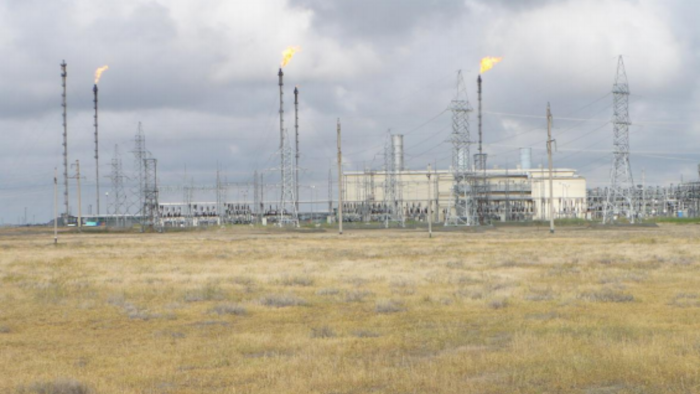
Image: the HSBC-funded Tengiz oil field, Kazakhstan. Research shows that in a world that complies with the Paris Agreement, the oil field would not be viable.” Image credit: Crude Accountability.
Conclusion
These dirty deals are only a tiny snapshot of HSBC’s total portfolio. As you read these words, HSBC is arranging countless more dirty deals, making the climate crisis worse despite its empty platitudes for climate action.
The ground-breaking May 2021 International Energy Agency report shows the urgent need for change. The report stated that no new fossil fuel extraction can be permitted as of this year if the world is to meet the ‘net zero’ target that HSBC says it supports. Given that HSBC and other banks rely on IEA scenarios, this is a stark warning.
HSBC must:
- Immediately withhold financing activities to companies and projects expanding the scale of the fossil fuel industry, or otherwise basing their business plans on scenarios consistent with temperature increases higher than the Paris Agreement’s goals;
- Commit to phasing out financing for all fossil fuels, including via its ownership of companies, in line with the Paris Agreement’s goals.
Action that falls short of this is not appropriate to the scale of the crisis.
Footnotes
[1] This figure is for the projects highlighted in this report, and so excludes total emissions from the companies mentioned – for example, we include emissions from the Line 3 pipeline, but not total emissions from its parent company, Enbridge.
[2] CSIRO Energy report on Pg25: “Where natural gas displaces renewable forms of electricity generation rather than coal, such as where market conditions prioritise natural gas over solar, wind or nuclear energy sources, potential climate benefits are reduced and possibly reversed.”
[3] Canadian Parliamentary Budget Office, ‘Trans Mountain Pipeline – Financial and Economic Considerations – Update,’ Pg6
[4] William T Vollman, ‘Poor People,’ Pg194
[5] Friends of the Earth Europe, ‘Kashagan Oil Field Development,c,’ December 2007, Pg14
[6] William T Vollman, ‘Poor People,’ Pg188
Methodology
Market Forces compiled a list of just some of HSBC’s most controversial funding for FF projects since the Paris Agreement and compiled this into key themes. Data on project funding was sourced via Refinitiv Eikon and IJGlobal.
Data on emissions were taken from a variety of sources, including project documents, research from other organisations, and previous Market Forces analysis. Country comparisons were calculated using the Emissions Database for Global Atmospheric Research (EDGAR).
The total emissions figure cited in this report – 523 million tonnes of C02 per year – is for the projects highlighted in this report (Ichthys LNG project, Australia Pacific LNG project, Paiton-3 coal plant, Trans Mountain Pipeline, Wink To Webster Pipeline, Line 3 Pipeline, Coral South LNG project, Offshore Cape Three Points Project, RAPID project, Tengiz oil extraction project), and so excludes total emissions from the companies mentioned – for example, we include emissions from the Line 3 pipeline, but not total emissions from its parent company, Enbridge.
